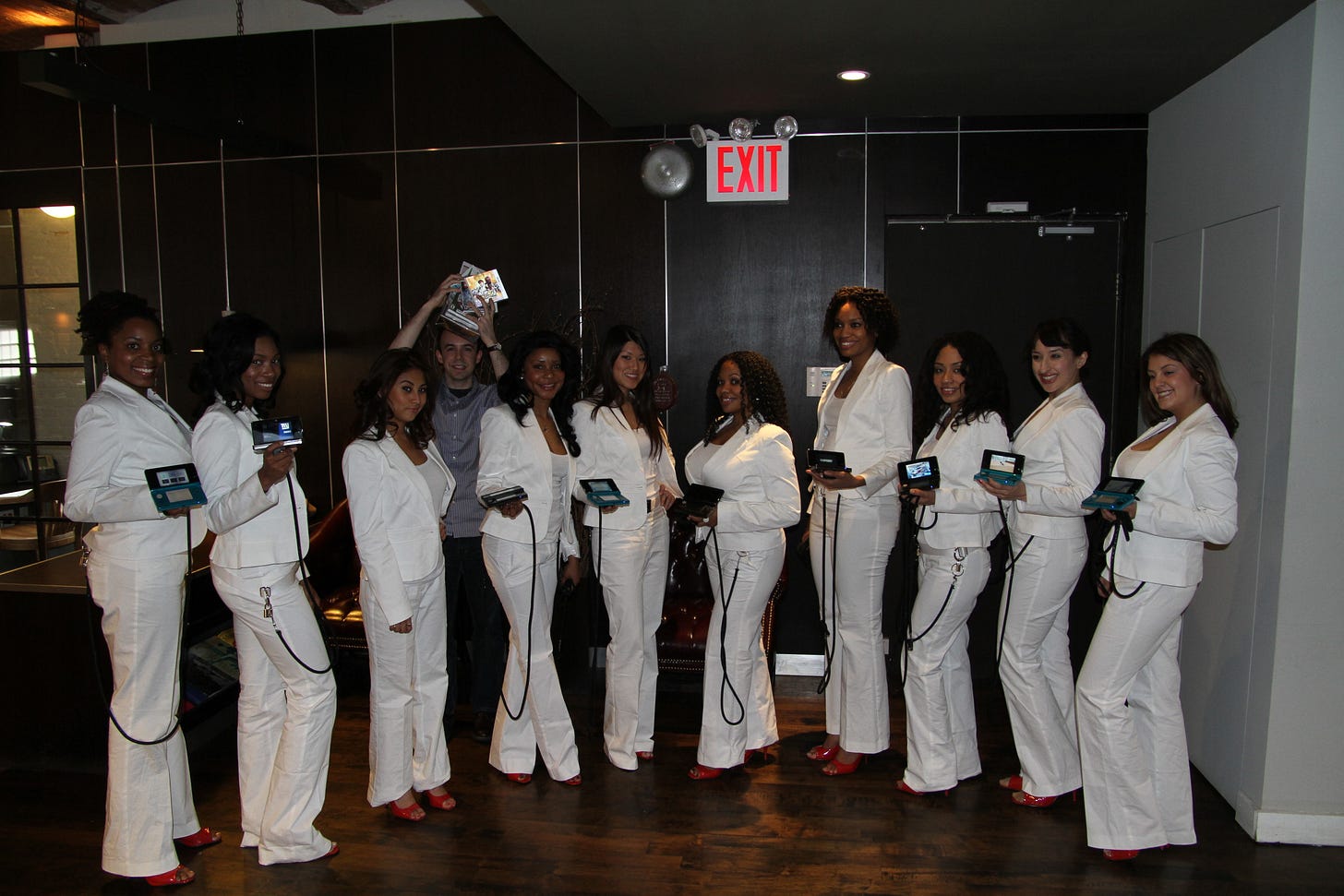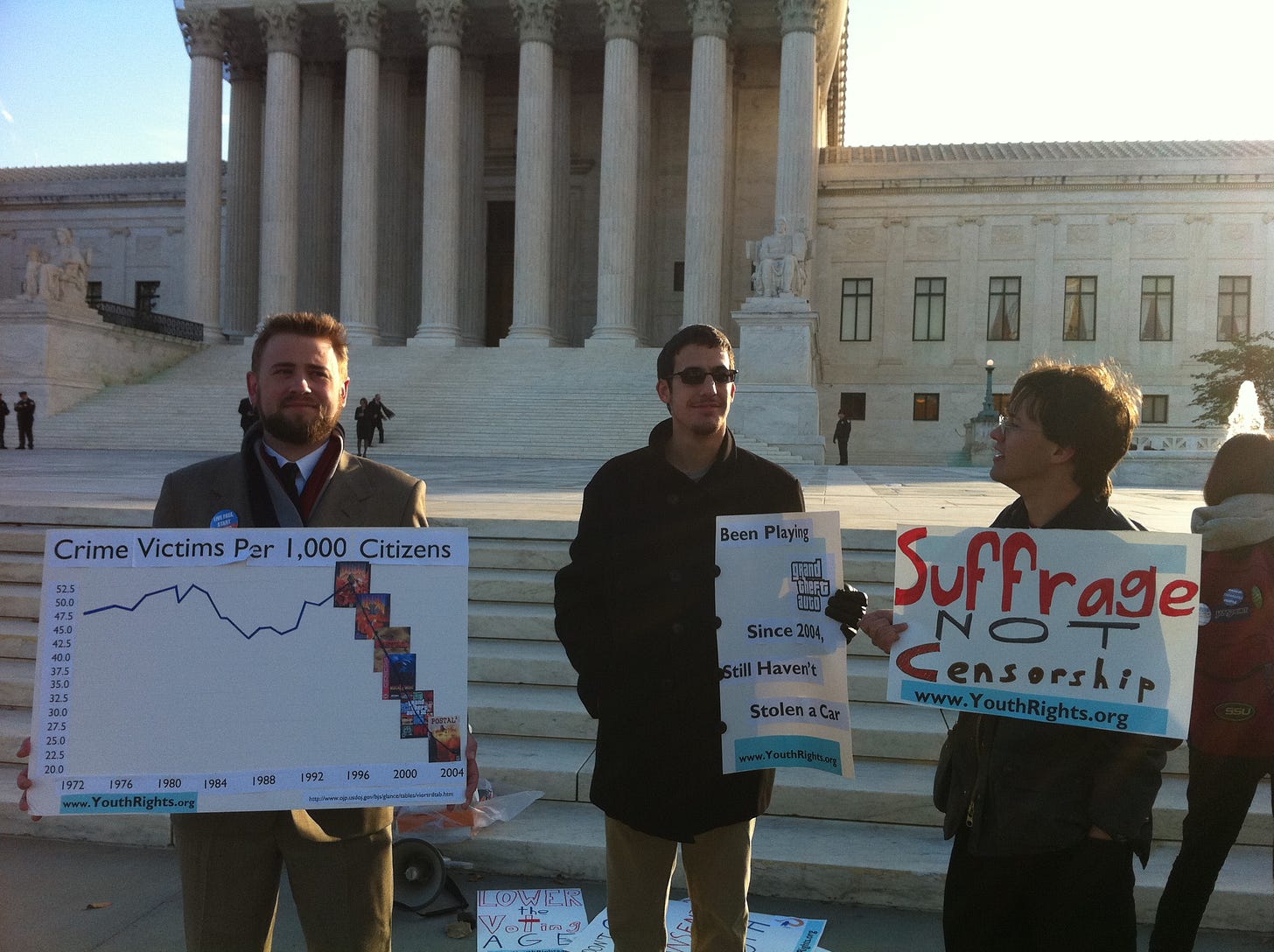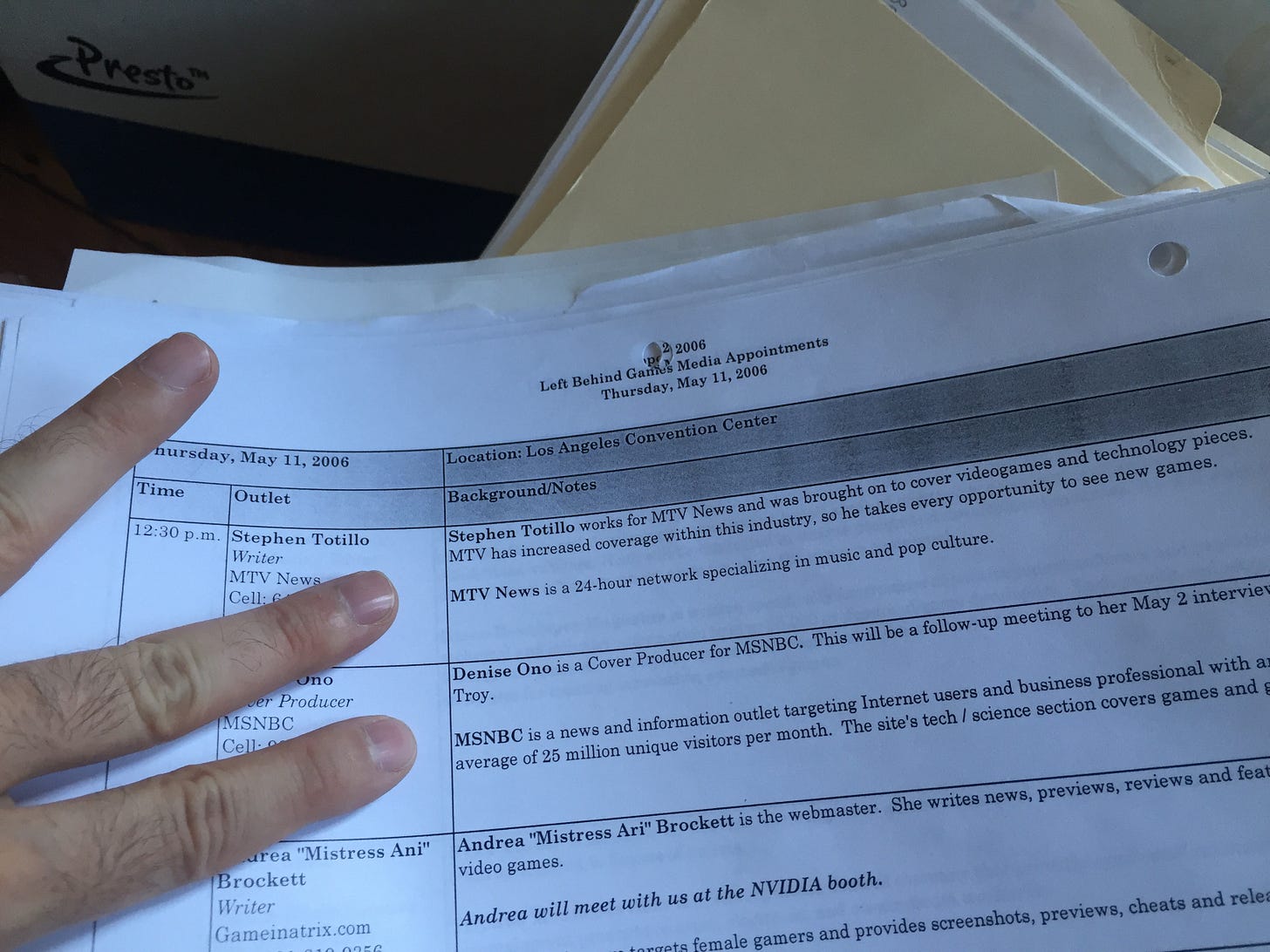Memory lane
Moments from the gaming beat that I'd almost forgotten. Plus: Some big gaming news that rudely didn't take the holidays off.

On March 15, 2011, 10 women in white suits showed up at Gawker Media headquarters in New York City to hand me a Nintendo 3DS.
The 3DS they had for me was in a box, but they each held one, too, for anyone in the office to try. The small handheld, which would officially launch in North America later that month, displayed stereoscopic 3D images without the user needing to wear 3D glasses. You had to see it in person to appreciate the effect. I guess Nintendo was eager to turn even a hardware delivery into a showcase event.
Because Nintendo loves security as much as it loves marketing, the women’s 3DS systems were tethered and padlocked to their bodies (not the first time Nintendo had done something like this).
I don’t think we ran photos of the delivery on Kotaku, where I was deputy editor at the time. We were trying to shed the impression that games journalists were just an extension of games marketing. And the game industry was only slowly dialing back from its tendency to use pretty women to promote its products.
But, yes, that happened.

I found these 3DS delivery photos on my laptop this week while rummaging through old files and doing some job-transition prep.
The shots are a memento of a different time, before companies redirected those kinds of stunts toward YouTube influencers (I appreciate getting review code from a publisher but don’t miss the days of Nintendo sending a barbershop quartet to deliver a copy of Rhythm Heaven. That was weird!). It was also still nine months before I got the EiC chair at Kotaku for a wild decade-long run.
A couple of other interesting visuals I found….

A photo I took the morning of November 10, 2010, outside the U.S. Supreme Court, before attending oral arguments about whether the Constitution allowed states to pass laws criminalizing the sale of violent video games to minors (the ruling, seven months later: nope).
A snapshot of a PR firm’s briefing book that was prepared for the makers of a video game based on the Christian-apocalypse Left Behind novels. The binder had been left on top of a trash bin outside of the Los Angeles Convention Center, circa E3 2006. (I’ll admit this was tamer than I’d hoped. The edgiest entry, for the two heads of Penny Arcade, noted that they “do not play friendly” with Jack Thompson, the lawyer who crusaded against violent video games in the 2000s.)
I wish I had a lot more photos, but covering video games hasn’t made for the most visual of careers. Games themselves are interesting to look at, but, when a screenshot will often do for an article, the photographic record of the work is thin.
I also just didn’t always have the gear, or the reflexes to take all the photos I would have liked.
I wish, for example, that I had a photo of the cots I was shown when visiting the Japanese game development studio Yuke’s back in 2006. This was long before discourse around video game development crunch had become the norm. A producer there did not hesitate to tell me that the cots were for the studio’s developers, when they were working late on the latest pro wrestling video game that they specialized in, and needed to sleep in the office. They noted that the sleeping area got rank during hot summers.
I wish I had my camera out at PAX East 2010 when a hacker barreled past me and game developer Chandana Ekanayake as we were chatting. The rather bold young man had been caught jacking into another game’s demo kiosk with a USB stick to steal its code. He was on the run. (In 2021, he was sentenced to seven years in prison for a warranty fraud scheme.)
An MTV colleague and I did get pictures of Hideo Kojima’s brain scans in 2008, when I interviewed the legendary designer at what I was told was his work apartment in Roppongi. We posted pictures, but they don’t show up on MTV’s site any more. Even the internet archive has lost them…
During this brief transition from Axios to Game File, I keep re-discovering how much I’d forgotten.
My Axios work is fresh in my mind, as is much of my Kotaku run. My four years (2005-2009) covering games for MTV News is more cloudy.
Yes, I interviewed gamers in Baghdad who had been blogging about life in mid-2000s Iraq. (“If we can tell interesting and compelling stories, it makes it harder for them to shoot us or to kill us.”)
I’d also chatted with Burger King executives about the making of the company’s weird video games? I’d tracked drama around a planned video game about the paintings of Bob Ross?
Oh, right, I had interviewed a man whose life was changed by the launch of a Nintendo console in 2006. His first name: Wii.
Preparing for this nostalgic post, I had vaguely recalled that I really liked my 2006 interview with Sopranos creator David Chase about a video game spin-off to the revered mob drama. But I’d forgotten why. I reread that article this week and I just have to share a chunk. It’s an all-timer in terms of an interviewee not caring about any promotional talking points. Bear in mind, the game’s publisher set up the interview to help promote the game..
Here’s Chase:
"What I didn't want to have happen was that the game and the show bleed together, that any of the stuff in the real story arcs that we have [on TV] -- or any of the real narrative we have -- was in the game or had anything to do with the game," Chase said.
And why would that be?
"I think [they are] two separate experiences. Playing a game and watching a drama are two completely different things. And I certainly never wanted to sell the game on the show or do any cross-pollination."
Characters introduced in the game would never appear in the show?
"No way, shape or form," Chase said, shaking his head. "That will never happen. In fact, we don't even have New York [in the game]. We don't even talk about New York mobsters. The other people in the game are from Philly. We tried to separate it completely."
… he offered [the developers] enough feedback on the game's treatment to feel good about it: "I just wanted to make sure the characters were true to the characters."
But as far as he's concerned, games have limits.
"Games have a function," he said. "It's a physical function. The character has to go from here to there, has to shoot that, has to drive this, has to knock that down, has to jump up here. ... That's how a game works. So cooking dinner, going to Lamaze class, there's no way to figure that into a game at this point. Maybe somebody else can do it and maybe somebody will, but that wasn't really what this game was about. It was supposed to be a story about a kid who wants to be a gangster -- a punk who wants to be a gangster -- and so that's what we did."
Chase said he doesn't want to make games in the future. "It does not pique my interest to work on them." Why? "It really isn't -- well it is a narrative, I suppose, in its own way -- but the act of watching a movie or a TV show or reading a book, God forbid, is you're seeing someone else's story and you can go through their story and learn from it or feel with it or laugh at it without having to go through any of the pain or the adventures. The game is different: There is no identification, really, any emotional identification."
I’d like to think the video game medium has advanced since 2006. It can handle interactive Lamaze classes now, perhaps?
That’s enough reminiscing for today. This is still Game File’s soft launch phase, and this is not really an official newsletter.
The news, however, does not care about soft launches, nor holidays. Let’s get to some of it…
Last Friday, Insomniac Games acknowledged the ransomware hack that spilled many of the company’s development and business secrets into public view. The data theft also included personal information about the studio’s employees. “This experience has been extremely distressing for us,” the studio wrote in a social media post. Kotaku’s Ethan Gach reported that the hacked files included discussions of potential headcount reductions at the acclaimed studio, possibly at the behest of parent company Sony. Bloomberg’s Jason Schreier said the studio planned to hold an internal meeting about the potential layoffs after the holidays.
A teenager responsible for the 2022 hack of Rockstar Games that exposed development footage of the then-unannounced next Grand Theft Auto was sentenced by British authorities last week to an indefinite hospital order, per the BBC’s Joe Tidy. Context for that sentence: Eighteen-year-old Arion Kurtaj has acute autism and is considered a high risk for hacking again, given that he breached Rockstar with an Amazon Fire Stick, his phone and a hotel TV while on bail for other hacks. The BBC notes Kurtaj “will remain at a secure hospital for life unless doctors deem him no longer a danger.” (More hacked GTA data was released over Christmas, along with a message of support for Kurtaj, according to Bleeping Computer.)
Chinese regulators floated new rules last Friday that would prohibit popular free-to-play online games in the country from offering players incentives for daily log-ins and would require issuing warnings to users who display “irrational consumption behavior,” per a CNBC translation. The news crushed Chinese gaming stocks. Tencent lost $43 billion in market value in one day; NetEase shares dropped nearly 25%. But, by Saturday, the government said it would “further modify and improve” its regulations and hear out the concerns of involved companies. That was good enough to recover about half of those losses.
TV shows from Discovery that were slated for removal from PlayStation’s store and video player at the end of the year—even for people who already bought them—will not disappear after all. That’s thanks to an updated licensing deal between Sony and Warner Bros Discovery.
Earlier in the month, Microsoft shareholders resoundingly rejected an external shareholder proposal that claimed Microsoft’s employee benefits favored workers get abortions over those who have children (More from me about this one here). The failed effort, which also criticized Microsoft’s support for trans-inclusive health care, is part of a wave of so-called anti-ESG shareholder proposals that became more abundant across corporate America in 2023.
On Wednesday, a federal appeals court in California backed a lower court’s decision to reject former Blizzard employee Jessica Gonzalez’s attempt to block or modify Activision Blizzard’s September 2021 settlement of a sexual harassment suit brought by the Equal Employment Opportunity Commission. While Activision did not acknowledge any wrongdoing as part of the settlement, both parties had agreed to the establish an $18 million victims fund and three years of federal oversight. Gonzalez had attempted to intervene, saying the consent decree was too narrow. But Wednesday’s ruling found that her objection, filed in March 2022, came too late and would have required too many 11th hour changes. The court wrote: “Such an imposition would ‘upset the delicate balance’ the parties have thus far reached after several rounds of negotiations, amendments and proposed decrees.”
Today is Bobby Kotick’s last day as CEO of Activision Blizzard. He became Activision’s CEO in 1991.





Kojima's brain scans would've been interesting to see
I wish we could find out where the ladies-tethered-to-Nintendos came from—Like, were these people actors? Employees? Bizarre.